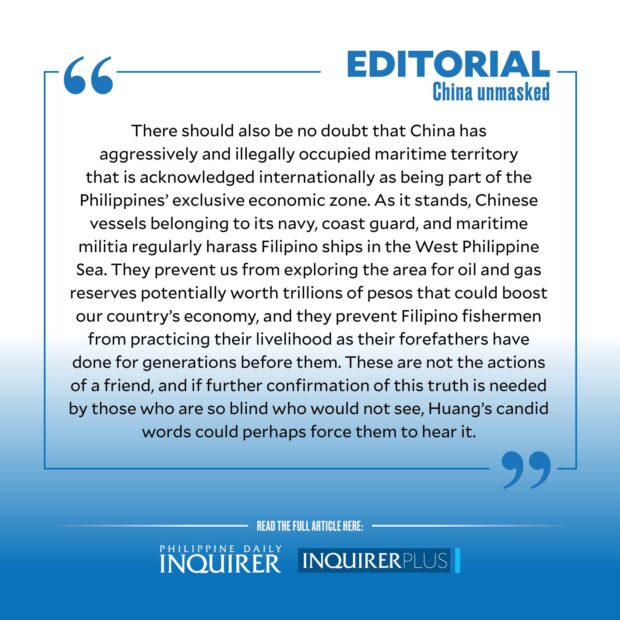
Literally, it means that it is by its mouth that a fish is caught. Figuratively, it reminds us of that words sometimes unintentionally reveal the truth that a person has been trying to mask or gloss over.
And sometimes—as in the case of Chinese ambassador to the Philippines Huang Xilian’s recent comments—words reveal the true nature and intent of someone.
Never mind that he sounded undiplomatic when he “advised” the Philippines to unequivocally oppose Taiwan’s independence “rather than stoking the fire by offering the [United States] access to the military bases near the Taiwan Strait if you care genuinely about the 150,000 [overseas Filipino workers]” working on the island.
After all, Chinese diplomats during the presidency of Xi Jinping have proudly branded themselves before the international community as so-called wolf warriors, often using combative and confrontational language when defending China and its interests and when criticizing opponents both perceived and real.
Instead of criticizing the words of Huang, the Philippines should welcome it as confirmation that China is not that true friend it has been claiming to be during the six years of the Duterte administration.
In fact, the Chinese ambassador’s words sounded more like threats uttered by gangland mobsters when threatening victims with violence unless they comply with orders or cough up protection money: “It would be a pity if anything happened to your family because of this.”
Given these realities, the Philippine government should promptly act to prepare our country for the possibility that China will try to retake Taiwan by force, an option which it has not rejected and, in fact, seemingly leaned more heavily toward in recent times. This was confirmed by Huang who stated in unequivocal terms that “we will not renounce the use of force, and we reserve the option of taking all necessary measures.”
Far from being none of our business, the use of force to resolve conflicts should be a cause for concern for the civilized world, and even more so for Philippines as Taiwan lies only 159 kilometers to our north or a mere 10 minutes of flying time at its closest point.
With this ample warning, under no means should the Philippine government be caught flat-footed by the possible outbreak of war, especially since the thousands of Filipinos working on the island have to be looked after and almost certainly be repatriated—no easy feat under ideal circumstances, much less when there is a shooting war going on.
President Marcos’ order to the Department of Foreign Affairs and other concerned government agencies to prepare contingency measures to safeguard the well-being of Filipinos in Taiwan is a step in the right direction, and should be ramped up further.
Beyond this, however, there should also be no doubt that the Philippines subscribes to its long-standing One China policy. What we don’t subscribe to is the use of violence to resolve disputes between nations.
No doubt that we are walking a tightrope because of these two conflicting demands, and it will become even more challenging if a war breaks out and the US begins to use its growing number of military facilities and access points through the Enhanced Defense Cooperation Agreement.
This calls for deft maneuvering on the part of the younger Mr. Marcos, similar to how his father allowed the use of Clark Air Base and Subic Naval Base to logistically support the American military during the Vietnam War, but specifically denied permission for the US Air Force to bomb North Vietnam using B-52 bombers flying out of Clark.
There should also be no doubt that China has aggressively and illegally occupied maritime territory that is acknowledged internationally as being part of the Philippines’ exclusive economic zone. As it stands, Chinese vessels belonging to its navy, coast guard, and maritime militia regularly harass Filipino ships in the West Philippine Sea. They prevent us from exploring the area for oil and gas reserves potentially worth trillions of pesos that could boost our country’s economy, and they prevent Filipino fishermen from practicing their livelihood as their forefathers have done for generations before them.
These are not the actions of a friend, and if further confirmation of this truth is needed by those who are so blind who would not see, Huang’s candid words could perhaps force them to hear it.